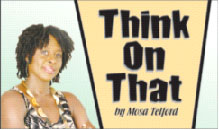Did they assume that I was in danger of losing my way? How could they not see that I am not a person with fabricated beliefs about myself? That I am not enslaved to ideas that were invented by envious and cowardly men, whose actions resulted in the damage or death of many cultures and, therefore, the pride of many people? Could they not have sensed that I know I am an  amalgamation of uniqueness, strength, beauty and courage– the epitome of what it means to be a proud “hue-man?”
amalgamation of uniqueness, strength, beauty and courage– the epitome of what it means to be a proud “hue-man?”
What they saw was black skin that was in danger of becoming a part of the epidemic. They saw this because many dark-skinned and even not-so-dark people are becoming addicts of creams and soaps to lighten the colour of their skin. The strangers felt it necessary to not only compliment me on my complexion but also to advise me not to bleach.
There was the vendor in Bourda Market, who called me as if it was something urgent.
“You are beautiful. Don’t bleach.”
Then there was the Rastafarian woman in Stabroek Market, who appeared entranced by my appearance. She said, “Look at beauty. Keep duh colour sistren.”
And there was the gentleman who was driving but who still thought it was necessary to stop and state that most of the dark-skinned young women he was encountering in recent times were bleaching.
Initially, I was flabbergasted by the perceived assumption of these strangers that, perhaps, I was thinking about or on the verge of bleaching. As good intentioned as they were, their actions could also be interpreted as insulting. I am not a poster child for bleaching candidates.
I tried to stop thinking about those experiences and all the others I would have had over the years of my life. I have long passed the stage where there is obsession with skin colour. But then I was standing in line, waiting to pay a bill and it happened again. An older woman approached me and thanked me for not bleaching. The problem that I was trying hard to ignore kept confronting me by the approaches from strangers. Was it the universe’s way of telling me that I had to do or say something about it?
Though I am strongly against bleaching, I have gotten to a stage in my life where I choose not to obsessively concern myself with what other people are doing. We all have freedom of choice and people will do what they think will make them happy. I must concern myself with my own well-being. But I allowed the woman’s words to break the barrier that I was building in my mind to not confront what is happening—that we are dealing with a kind of bleaching crisis. I was at a location recently and a woman entered and asked for a lightening soap. I listened to the conversation between her and the proprietor.
“Some ah dem overdoing it. You seeing all dey veins.”
“They can’t even walk in the sun without umbrella.”
“Even if they know the dangers that won’t stop them from doing it.”
“They use nothing to care for the skin.”
“I only use the soap to tone.”
Toning. It seems to be what many suspected of bleaching are now calling what they are doing. I have seen people who have drastically transitioned from one colour to another and who say that they are only toning. Maybe for those who are in fact bleaching, it lessens their guilt or shame or makes it sound more sophisticated.
A point of hilarity is encountering people you know and not immediately recognising them because of the dramatic colour transformation. But really, there is nothing amusing about this issue.
And many of us judge. “They are stupid,” we say, or, “They are psychologically damaged.” Many of us do not think about how they got there. Or why the practice seems to be becoming more popular; that even though many folks are aware of the health risks they are bleaching happily. Perhaps they feel more beautiful and accepted. Perhaps they get more attention and it builds their self-esteem.
I recall how isolated I felt when I was growing up because unlike now, when it is mostly positive things that are said about my skin colour, the narrative was different then. Like many others, I was shaped with the idea that to be lighter was better. I was placed early in life in a mental prison that made me wish constantly that my skin colour was lighter.
I escaped that prison because of the knowledge I sought after during my late teens. I went searching because deep within I knew that what I was experiencing could not be the whole picture of what life was supposed to be. I had to find those pages of history that preceded the Caribbean history I was taught; slavery and indentureship could not be the foundation of all. Massa’s self-appointed superiority was false. I found what I was looking for, found my saviour and my pride in the accounts about ancestors who created civilizations, invented and ruled. My growth has not stopped taking place since.
But many people never find their escape or a savior to deliver them from their prisons. They are stuck in the deception in which they were shaped. They continue to think that they are descended from a lineage of failures who accomplished nothing before plantation life. They look at Hollywood and Bollywood and see that what resembles them is not as celebrated as the others. Even in Nollywood, they notice that some of the actors and actresses they celebrate have also bleached.
And some of the children whose parents taught them nothing about who they are, because the parents themselves do not know, find guidance in dancehall singers like Alkaline and Kartel, who have managed to sell the destructive idea that bleaching is something “cool” to do.
But how can we judge them because they have no knowledge of self? While there is always awakening occurring and what is natural and beautiful is being more widely celebrated, there is a multitude of people who cannot wrap their minds around what that means.
So, what shall we do? It is not enough to say, “Don’t bleach” and teach them nothing about who they truly are and about the melanin that gives them their pigmentation. They must be taught how uniquely intertwined they are with the universe. It is not enough to say that parents must start teaching their children when some of the parents are ignorant. Or when for many even that which they consider God is not in their image, or their culture perpetuates the idea that light skin is better than dark skin.
The work is immeasurable for those who have the knowledge. Pride must be restored or birthed in those who have lost or cannot seem to find their way. The teaching and retelling of history must begin and they must be able to see a saviour when they see their reflection. They must be able to smile because they know they are beautiful just the way they were made. They must be able to love the skin they are in.









